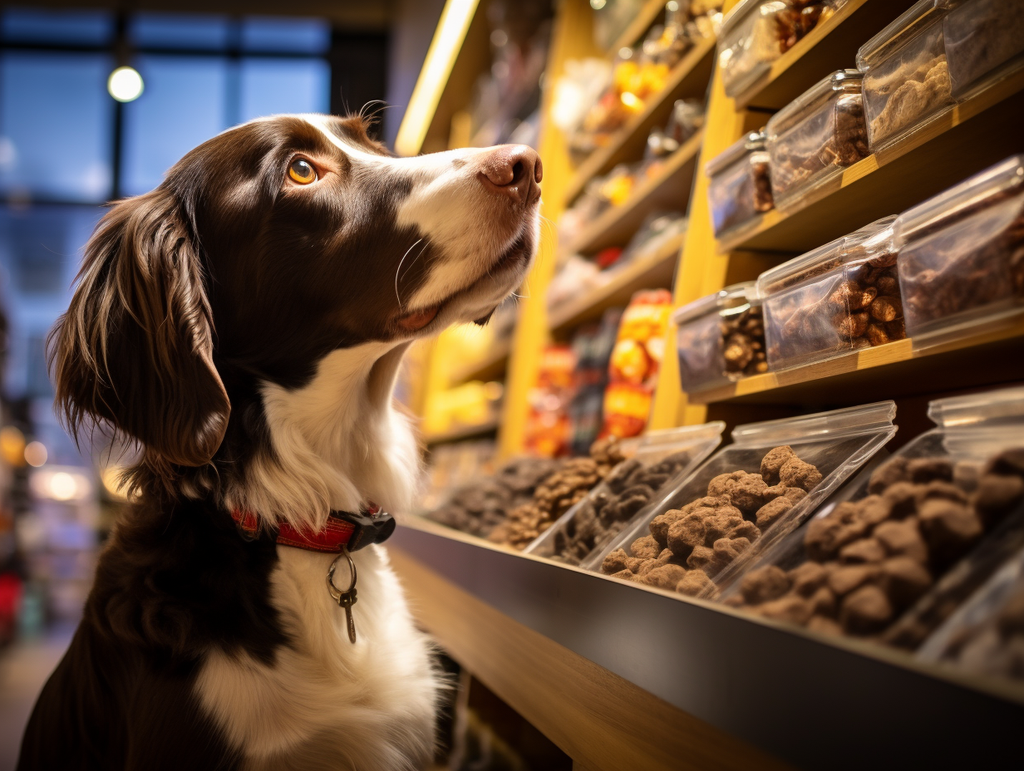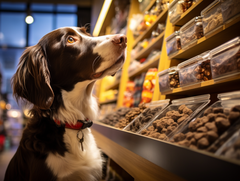You've probably heard the saying, "You are what you eat." Well, the same holds true for our four-legged friends. What goes into your dog's digestive system can have a profound impact on their overall well-being, from their mood to their immunity.
In this comprehensive guide, we'll delve into the fascinating world of canine gut health and why it should be at the forefront of any caring pet owner's mind. You'll discover the science behind gut-friendly dog treats, what ingredients to look for, and how to make the best choices for your furry friend.

"the gut's role in a dog's health extends far beyond just breaking down food."
Why Gut Health Matters for Your Dog
A dog's gut is more than just a food processing plant. It's a complex ecosystem that plays a critical role in your dog's health, and it's high time we pay it the attention it deserves.
A dog's gut is more than just a food processing plant. It's a complex ecosystem that plays a critical role in your dog's health, and it's high time we pay it the attention it deserves.
Whether you're a new dog parent or a seasoned pro, you'll find actionable tips and practical advice that could be a game-changer for your dog's health.
So, if you've ever found yourself pondering questions like, "What are the best gut-friendly treats for my dog?" or "How can I improve my dog's digestion?", you're in the right place. Read on to find out how you can be the hero your dog's gut has been waiting for!
Often, when we think about gut health, our minds go straight to digestion. While that's certainly a key part of it, the gut's role in a dog's health extends far beyond just breaking down food.
It's essentially the body's second brain, a bustling hub of biological activity that significantly influences your dog's mental and physical health. Here are some reasons why gut health is a big deal for your pup:
The Gut-Brain Connection
Yes, you read that right! The gut is often called the "second brain" because it communicates directly with your dog's central nervous system. A healthy gut can positively impact your dog's mood, behaviour, and even cognitive function.
Immunity Boost
Approximately 70% of a dog's immune cells reside in the gut. Maintaining a healthy gut flora is essential for your dog's ability to fend off infections and diseases.
Nutrient Absorption
It's not just about what your dog eats, but how well they can absorb those nutrients. A balanced gut ensures optimal absorption, so your dog gets the most out of their meals.
Allergy and Sensitivity Management
Did you know that an imbalance in the gut can make your dog more susceptible to food sensitivities and allergies? A healthy gut can make all the difference.
Hormonal Balance
Several hormones that regulate appetite, stress, and growth are influenced by gut health. This makes it pivotal in controlling your dog's weight and stress levels.
Understanding the broad role that gut health plays in your dog's overall well-being highlights the importance of making informed choices when it comes to their diet and, of course, their treats!
Understanding the Gut-Brain Connection in Dogs
Your dog’s gut is a bustling hub of activity that has a big say in their overall mojo. Yep, the gut-brain connection in dogs is making waves in the research world, and it's about time we all tuned in.
What is the Gut-Brain Axis?
So, what's this gut-brain axis everyone's yapping about? In simple terms, it's the two-way chat between your dog's gastrointestinal tract and their unconscious mind.
This communication isn't just idle gossip; it's complex signals involving neural pathways, hormones, and even the immune system.
Its importance in overall health was laid out in a recent study: "The Gut-Brain Axis: How Microbiota and Host Inflammasome Influence Brain Physiology and Pathology" published in Frontiers in Immunology. It's a game-changer!
Why is it Important for Dogs?
This isn't just for the lab coats and stethoscopes; it's real-world stuff for your pooch. A balanced gut is like the VIP lounge for your dog's health—physical and emotional.
Imbalances can lead to anything from tummy troubles to mood swings. Don't just take our word for it; there's solid research backing this up.
The Role of Prebiotics and Probiotics
Hold up! Before you start Googling 'doggy diets,' let's talk about the good guys: prebiotics and probiotics. These microbial mates keep the bad bacteria at bay by fuelling the good bacteria. That help with digestion, and rolls out the red carpet for essential nutrients to be absorbed by your dog.
How to Improve Your Dog's Gut Health
We all want our dogs to live their best lives. A balanced diet rich in natural prebiotics and probiotics, along with plenty of exercise, and stress-busting activities are your go-to moves.
"Cold-pressed treats can encourage the growth of good bacteria"
The Role of Prebiotics in Gut Health: Why Your Dog Needs Them
Prebiotics encourage the growth and activity of beneficial bacteria, keeping the harmful ones at bay. This balance is essential for optimal gut health, which has a domino effect on other aspects of your dog's health like skin condition, mental well-being, and energy levels.
Ultra-processed food like extruded kibble, when not fed as part of a more varied diet, can discourage the growth of a broad range of healthy bacteria, leading to digestive problems, bloating, wind, diarrhoea and food sensitivities.
Gut healthy dog treats and less processed foods that are cold-pressed, (not cooked) can help boost those beneficial microbes and ease your dog’s discomfort.
Gut-Healthy Ingredients: Why They Matter
When it comes to gut health, not all dog treats are created equal. Your dog's gut is practically a universe teeming with bacteria, and the right treats can make that universe a harmonious place.
So, let's get down to the bare bones— and botanicals—of what makes some treats better for your dog's gut health.
Inulin: More Than Just Root Talk
Inulin is a bit of a superstar for doggy digestion. Here are just a few benefits for your dog:
- Nourishing Good Bacteria: Inulin acts as food for beneficial gut bacteria like Bifidobacteria and Lactobacilli, helping them flourish.
- Balancing Gut Microbiota: A healthy balance of gut bacteria aids in optimal digestion and nutrient absorption.
- Enhancing Immune Function: The promotion of good bacteria contributes to a stronger immune system through the production of natural antibodies and white blood cells.
- Improving Bowel Regularity: Adds bulk to the stool and acts as a mild laxative, aiding in more regular bowel movements.
- Lowering Risk of Gastro Disorders: A balanced gut can reduce the risk of conditions like irritable bowel syndrome (IBS), colitis, and some cancers.

Turmeric: The Golden Spice with Gut-Healing Powers
Turmeric isn't just for spicing up your curry; this vibrant yellow spice has been making waves in the pet wellness industry.
Known primarily for its active component, curcumin, this golden gem is chock-full of antioxidant and anti-inflammatory properties. But did you know it's also a boon for your dog's gut health? Let's dig in!
A Gut Feeling about Turmeric
Curcumin in turmeric has been studied for its ability to balance the gut microbiota, reducing gut inflammation and improving overall digestion. It acts as a prebiotic, nourishing the good bacteria in your dog's gut, which in turn helps in better nutrient absorption.
Scientists are still discovering more every year about circumin’s far-reaching beneficial impact on gut health.
Beyond the Gut: More Goodness from Turmeric
While the gut benefits are quite fetching, turmeric has a broader range of health benefits for your dog:
- Anti-Inflammatory: Curcumin is a natural anti-inflammatory agent, which can help dogs with arthritis or joint issues.
- Boosts Immunity: The spice has immune-boosting properties, giving your dog an extra layer of defense against common illnesses.
- Natural Detoxifier: Turmeric stimulates bile production, aiding in the detoxification of the liver.
- Skin and Coat: Its antioxidant properties can give your pup a shiny, healthy coat.
So, when you see turmeric listed as an ingredient in a gut-healthy dog treat, know that it's like a multi-vitamin for your dog, just dressed in an exotic outfit!
What to Look For
When it comes to turmeric in dog treats, quality is key. Opt for treats that use organic, high-quality turmeric with no added artificial components. The curcumin content should be high, ensuring that your dog gets all the benefits this golden spice has to offer.
Turmeric, in short, is like that all-rounder in a sports team—good at everything but master of its domain, which in this case, is your dog's gut.
So, the next time you toss a turmeric-infused treat to your pup, take a moment to appreciate the golden goodness you're contributing to their health.
Why is Inulin so great for dog gut health?
Inulin is often derived from chicory root. It’s what’s known as a fructan, a type of soluble fibre that acts as a natural prebiotic in the digestive system.
It feeds the good bacteria in the gut, essentially giving them a dinner invitation to flourish.
More good bacteria mean a balanced gut microbiota, leading to improved digestion and a stronger immune system. A wave of recent studies provide valuable insights into inulin’s many benefits.
Yeast Cell Walls and the Magic of Beta-Glucans
Yeast cell walls are treasure troves of fuel for the good gut bacteria. They contain beta-glucans, complex sugars that have been linked to immune support and cholesterol reduction in dogs.
A study published in the Journal of Veterinary Medicine titled "Beta-Glucans as a Prebiotic for Dogs: Current Understanding and Future Prospects" details the positive effects of these natural plant compounds on canine health.
Chitin: From Bugs to Bowls
Insects. Yes, those six-legged critters, are making a grand entrance into the world of dog treats as a cutting-edge health food.
Chitin, the fibrous substance in insect exoskeletons (and those of prawns and shrimps), is gaining recognition as a remarkable prebiotic. It not only balances the gut flora but also brings a sustainability angle to the table.
Recent research highlights the incredible nutritional benefits of this novel ingredient for gut health.
A Symphony of Ingredients
It's not just about a single ingredient doing the heavy lifting. The most effective gut-friendly treats often bring these key elements together in a harmonious blend.
This synergistic interaction amplifies their individual benefits, creating a treat that's more than the sum of its parts.
By understanding the science behind these ingredients, you're not just tossing your dog a snack; you're contributing to a whole ecosystem of gut health. How's that for responsible pet parenting?
Feeling enlightened or ready to dive deeper into the world of gut-healthy dog treats? Let's keep this digestive journey rolling!
Key Points About Prebiotics:
- Prebiotics like inulin, beta-glucans from yeast cell walls, and chitin are essential for promoting a healthy gut microbiome.
- Incorporating treats with these ingredients can provide a balanced diet for your dog, contributing to their overall well-being.
How to Choose the Best Gut-Healthy Treats for Your Dog
Selecting the right treats for your dog's gut health can feel like navigating a maze. From flashy packaging to bold health claims, it can be difficult to distinguish between marketing hype and genuinely beneficial products. But fear not! We've got your back (and your dog's gut) with some straightforward pointers to help you make an informed choice.
Quality Over Quantity: What to Look For on the Label
Always read the ingredients list. Look for natural prebiotics like inulin, beta-glucans, and chitin. Avoid treats filled with artificial additives, preservatives, or fillers. These can disrupt your dog's gut health rather than improve it.
Trust but Verify: The Importance of Brand Reputation
Choose treats from reputable manufacturers that prioritise quality and safety. Check customer reviews and look for third-party testing or endorsements from veterinary bodies. A good brand is transparent about its ingredients and sourcing practices.
Tailored to Your Dog's Needs: Age, Size, and Dietary Restrictions
Not all dogs are the same, and neither are their nutritional needs. Puppies may need different prebiotics than senior dogs. Similarly, some dogs may have food allergies or sensitivities that require special attention. Choose treats that align with your dog’s specific health profile.
Taste Test: Because Your Dog Should Love Them Too!
Let's be honest; even the healthiest treat is useless if your dog turns up their nose at it. Look for treats that are not only nutritious but also delicious. Many high-quality gut-healthy treats are formulated to be as tasty as they are beneficial.
Price vs. Value
High-quality gut-healthy treats might come with a slightly higher price tag, but consider it an investment in your dog's long-term health and well-being.
Key Points:
- Always read the ingredients list and prioritise natural prebiotics.
- Choose reputable brands that focus on quality and safety.
- Tailor your choice to your dog's specific needs.
- Don't compromise on taste; your dog should love their treats as much as they love you!
Common Mistakes to Avoid When Choosing Gut-Healthy Dog Treats
We've all been there—standing in the pet food aisle, bewildered by the endless choices. But beware, not all treats are created equal, and some common pitfalls could steer you away from making the best choice for your dog's gut health.
Overlooking Nutritional Information
It's easy to get swayed by attractive packaging or marketing jargon, but always, and we mean always, check the nutritional information. Hidden sugars and excessive fats can negate the benefits of otherwise healthy ingredients.
Falling for Marketing Gimmicks
Words like 'gourmet' or 'premium' don't necessarily mean the treats are good for your dog. These terms are not regulated, and manufacturers can use them as they please. Stick to the facts, not the fluff.
Ignoring Caloric Intake
While treats can be a great way to reward your dog, they should not constitute more than 10% of your dog's daily caloric intake. Too many treats can lead to obesity, which is a gut health nightmare.
Skipping the Fine Print
We get it; reading the fine print can be tedious. But that's often where you'll find the real info on how the treats were made, including where the ingredients are sourced from and whether the product has been third-party tested.
Not Tailoring to Your Dog's Life Stage
Puppies, adults, and senior dogs have different nutritional needs. Make sure you're getting treats that are appropriate for your dog's age, size, and life stage.
Assuming All Natural Ingredients Are Safe
While we're all for natural ingredients, some, like certain herbs, can interfere with medications your dog may be taking. Always consult your vet if you're unsure.
So there you have it—avoid these mistakes, and you're well on your way to becoming a pro at picking the best gut-healthy treats for your dog.
How to Introduce Gut-Healthy Treats to Your Dog's Diet
Transitioning your dog to a diet rich in gut-healthy treats is not something you should do overnight. A gradual introduction is the key to a successful dietary transition, minimising any digestive upset. So, how do you go about it?
Start Slow
Begin by replacing just a small portion of your dog's regular treats with gut-healthy options. A good rule of thumb is to start with around 10% of the new treats and 90% of the old. Monitor your dog for any signs of digestive discomfort or changes in stool quality.
Observe and Adjust
Keep a close eye on your dog's behaviour, energy levels, and digestive health. If all seems well after a few days, you can start increasing the proportion of gut-healthy treats. Aim for a 20% new, 80% old ratio, and so on.
Consult Your Vet
Before making any significant dietary changes, it's always wise to consult your veterinarian. They can provide guidance tailored to your dog's specific health needs and conditions.
Make it a Routine
Once you've successfully transitioned your dog to the new treats, make it a regular part of their diet. Consistency is key to maintaining gut health over the long term.
Conclusion: The Road to a Happier, Healthier Dog Starts in the Gut
So there you have it, the comprehensive guide to gut-healthy dog treats. From understanding the science behind gut health to identifying the best ingredients and tips for a smooth dietary transition, it's all about making informed choices.
Because let's be real, a happy gut means a happy pup, and who doesn't want that?
Trust us, your dog's tail won't just be wagging; it'll be doing full-blown cartwheels.
But don't just take our word for it, consult your vet and try introducing some of these gut-healthy marvels into your dog's diet. Your four-legged friend will thank you, in their own waggy, licky way, of course.
By prioritising your dog's gut health, you're not only boosting their digestive well-being but also contributing to their overall health, from immune function to mental well-being. And remember, the journey to a healthier dog starts with one simple step—or treat, in this case.
So go ahead, give gut-healthy treats a go, and may your dog's gut flourish!
Here’s the Science
Prebiotics
- "Inulin-type fructans: Functional food ingredients" - Published in The Journal of Nutrition - https://pubmed.ncbi.nlm.nih.gov/35882293/
- Prebiotic inulin: Useful dietary adjuncts to manipulate the livestock gut microflora - Published in Brazilian Journal of Microbiology
- The Microbiota-Gut-Brain Axis -
- "Chitin and Chitosan: Production and Application of Versatile Biomedical Nanomaterials" - Published in International Journal of Advanced Research
The Gut Microbiome
- "The Gut-Brain Axis: How Microbiota and Host Inflammasome Influence Brain Physiology and Pathology" - Published in Frontiers in Immunology
- "The role of gut microbiota in dog and cat’s health and diseases" - Published in Veterinary Research
- "Gut-brain axis and mood disorder" - Published in Frontiers in Psychiatry
- The Role of the Canine Gut Microbiome and Metabolome in Health and Gastrointestinal Disease - Frontiers in Veterinary Science
- Importance of gut microbiota for the health and disease of dogs and cats
- Gut microbiota of humans, dogs and cats: current knowledge and future opportunities and challenges - British Journal of Nutrition
Yeast Cell Walls
- Yeast cell walls: A source of β-glucans with immunostimulant activity - Published in the Journal of Animal Science and Biotechnology
- β-Glucans, History, and the Present: Immunomodulatory Aspects and Mechanisms of Action - Journal of Immunotoxicology
- β-Glucans from Yeast—Immunomodulators from Novel Waste Resources
- "Beta Glucans and their applications in cancer therapy: Focus on human studies" - Published in Anti-Cancer Agents in Medicinal Chemistry
Turmeric
- Curcumin: A Review of Its’ Effects on Human Health - Published in Foods Journal
- Interaction between Gut Microbiota and Curcumin: A New Key of Understanding for the Health Effects of Curcumin -https://www.ncbi.nlm.nih.gov/pmc/articles/PMC7551052/
- Anti-inflammatory and antioxidant effects of Curcuma longa (turmeric) versus Zingiber officinale (ginger) rhizomes in rat adjuvant-induced arthritis - Published in Inflammation Journal
- Effect of dietary turmeric on breath hydrogen - Published in Digestive Diseases and Sciences Journal
- A randomized, double-blind, prospective, placebo-controlled study of the efficacy of a diet supplemented with curcuminoids extract, hydrolyzed collagen and green tea extract in owner’s dogs with osteoarthritis




